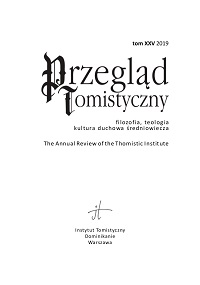Eschatologiczna niepoznawalność istoty Boga: Próba przekroczenia metafizyki Arystotelesa w ujęciu Grzegorza z Nyssy i Tomasza z Akwinu
Eschatological Unknowability of the Essence of God: An Attempt to Overcome the Metaphysics of Aristotle in the Doctrines of Gregory of Nyssa and Thomas Aquinas
Author(s): Damian MrugalskiSubject(s): Christian Theology and Religion, Metaphysics, Philosophy of Middle Ages
Published by: Instytut Tomistyczny
Keywords: essence of God; transcendence of God; unknowability of God; infinity of God; eschatology; anthropology; epistemology; Christian philosophy; Aristotle; Gregory of Nysa; Thomas Aquinas
Summary/Abstract: In his Metaphysics, Aristotle puts forward the thesis that the infinite is unknowable. In fact, the finite human intellect is unable to embrace any infinite form. Anyway, such an infinite form does not exist according to the Stagirite. The infinite can only exist in potency, not in act. In his Physics, on the other hand, the philosopher states that “nothing is perfect unless it has an end”. The Fathers of the Church struggled with these and similar theses. Considering God as an infinite being, they also had to answer the question whether his essence is knowable for the human intellect. For Scripture says that “we shall see Him as He is” (1 Jn. 3:2). The Greek Fathers’ answer, however, was negative. Because of its infinity, the essence of God cannot be fully comprehended, not even by the souls of saved men. Thomas Aquinas, although he also considered that the essence and power of God is infinite, in contrast to Aristotle, and thus impossible to fully comprehend, postulates that saved men will be able to see the essence of God – this is what eschatological visio beatifica is all about. Of course, this cannot be achieved without the help of God, who by his grace will enable the created human intellects to do what exceeds their natural abilities. It transpires, however, that this eschatological knowledge of the essence of God will never be complete. The aim of this article is to present two different theological approaches related to the issue of the eschatological unknowability of God’s essence by saved men. The first one is the position of Gregory of Nyssa, who assumes the unknowability of the essence of God, although he does not reject the infinite increase in the knowledge of God by man. The second is the position of Thomas Aquinas, who assumes the knowability of the essence of God, but states that it can never be a complete comprehension. These two positions, although they seem to be very different, are similar and convergent in many respects.
Journal: Przegląd Tomistyczny
- Issue Year: 2019
- Issue No: XXV
- Page Range: 369-403
- Page Count: 35
- Language: Polish

